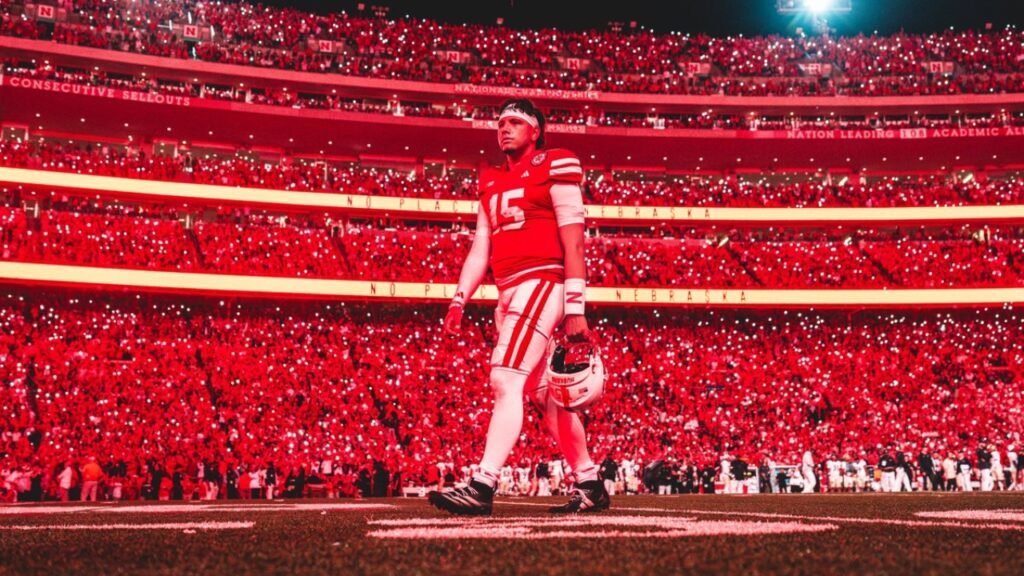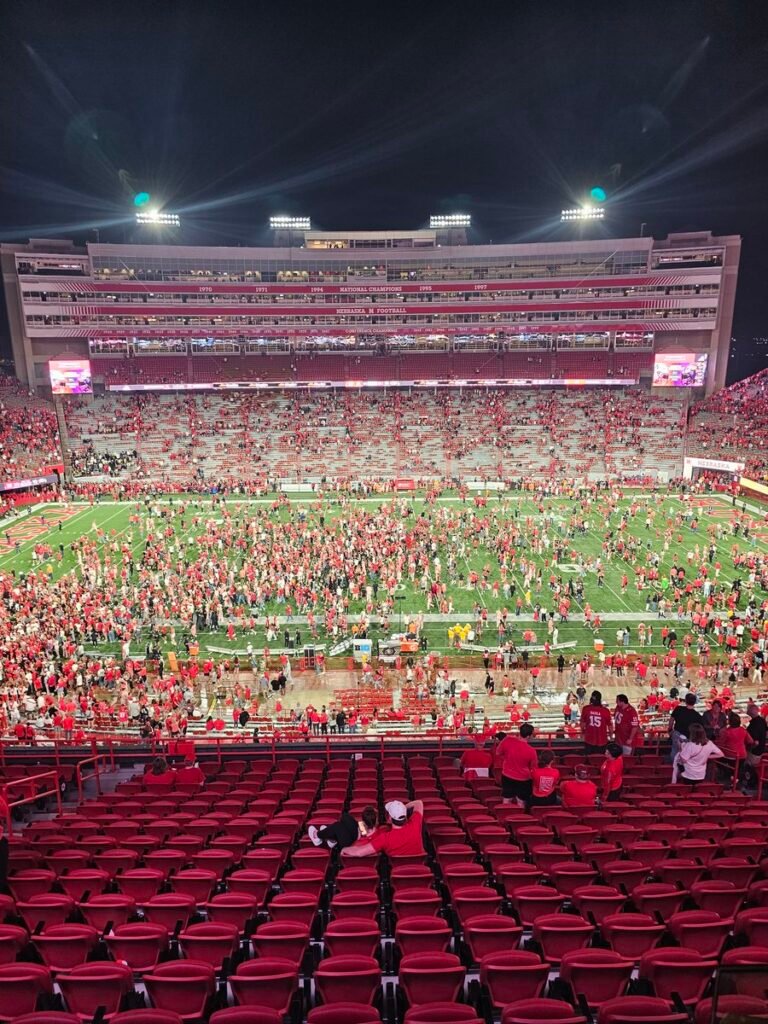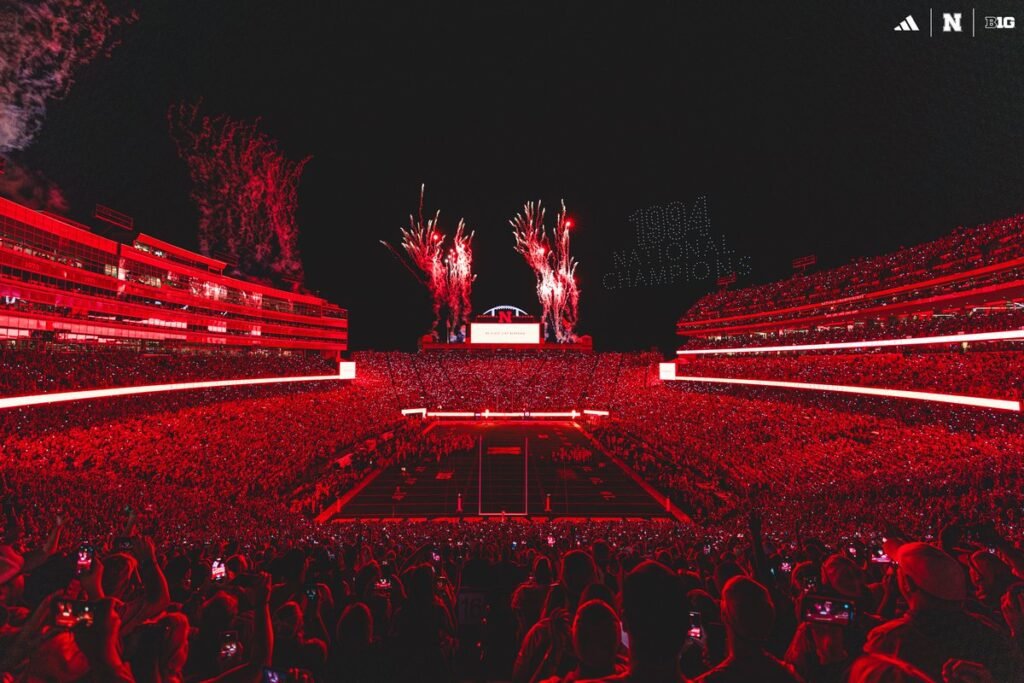Colorado’s Loss To Nebraska: Mistakes, Challenges, And What’s Next
- Leave a Comment
- William D
- September 8, 2024

In Week 2, the Colorado Buffaloes lost their first game of the season, falling to Nebraska 28-10 in an offensive that was never able to find its rhythm. Expectations for Deion Sanders and his redesigned Buffaloes team were high following a successful season opening.
Nevertheless, Colorado was outplayed by Nebraska’s defense, which held their rushing game to just 16 yards while applying constant pressure to quarterback Shedeur Sanders. Colorado had a massive 28-0 disadvantage at the half, and they would never get closer.
The Buffaloes’ head coach, Deion Sanders, did not mince words about the loss. “We just never got it together,” he said, citing the attacking blunders and sluggish start as the main causes of the defeat.
From the first drive, Colorado’s problems were apparent as they were unable to move the ball and frequently found themselves in difficult situations.
The offensive line’s protection problems and the Buffaloes’ failure to establish a run game made them one-dimensional and exposed to Nebraska’s defensive pressure, even though Shedeur Sanders had 244 throwing yards.
In light of the loss, Coach Sanders underlined the importance of improved offensive balance and protection. After being substantially rebuilt with the addition of transfer portals, Colorado’s offensive line struggled to contain Nebraska’s pass rush.
Sanders is aware that changes need to be done as the Buffaloes get ready for their upcoming game in order to avoid a repeat of this performance, particularly with more formidable opponents on the schedule.

A Slow Start Indicates Problemsns
Against Nebraska, Colorado’s offense got off to a slow start, executing 11 plays for a net loss of 2 yards in the first quarter. The Nebraska defense took advantage of the Buffaloes’ early inability to establish a rhythm and kept them pinned in their own half.
The Buffaloes struggled to generate any momentum because of protection concerns and a weak run game, which hampered every attempt to move the ball.
The issue had gotten worse by the end of the first half. At the half, Colorado was down 20-0 and Nebraska was clearly in control of the game. The Buffaloes struggled to find offensive consistency, and their issues were made worse by pivotal errors.
One of the most significant turning moments occurred when the team was even more behind when quarterback Shedeur Sanders threw an interception deep in Colorado territory that was recovered for a touchdown.
Regarding his team’s poor start, Deion Sanders was blunt, saying, “We just never got it together.” The squad spent the remainder of the game playing catch-up due to their inability to establish an offensive rhythm.
Colorado’s first-half errors, which included penalties, missed blocking assignments, and shoddy play on crucial downs, made it tough for the team to create any kind of comeback against a well-drilled Nebraska team.
The Buffaloes were never able to recover from their sluggish start, which finally proved to be fatal. Colorado was forced into a one-dimensional passing assault because their early troubles had shaped so much of the game, which gave Nebraska even more pressure.
This game made clear how crucial it is for a team with offensive talent to play with consistency from the outset, which is something Colorado will need to work on going ahead.
▁▂▃▄▅▆▇ 🗣️🏟️ pic.twitter.com/YzRB6XUUN0
— Nebraska Football (@HuskerFootball) September 8, 2024
Shedeur Sanders's Protection: The Secret to an Offensive Balance
The failure to keep quarterback Shedeur Sanders safe during Colorado’s 28-10 loss to Nebraska was one of the main problems. Shedeur was sacked five times while under constant pressure from Nebraska’s defensive line, and many of his passes were intercepted by advancing defenders.
The offensive line, which was reconstructed via the transfer portal during the winter, found it difficult to offer the required defense. Nebraska was able to interfere with Colorado’s offensive timing as a result, putting Shedeur in challenging situations all through the game.
Shedeur Sanders was under siege, but he still produced a decent passing stat line, going 23 of 38 for 244 yards and a touchdown.
These figures, meanwhile, fall short of describing the hardships he encountered. His continuous blows took their toll, and he completed several of them under duress.
Following many sacks and a helmet-to-helmet hit in the fourth quarter, Shedeur was forced to leave the game out of caution. Even though he played down his injuries, Colorado’s struggle to recover was undoubtedly influenced by the constant pressure on him.
The issues were made worse by the absence of a charge. With just 16 yards from their running backs combined, Colorado’s offense lacked balance and a means of relieving pressure on their quarterback.
Nebraska was able to concentrate almost solely on pressing Shedeur because the running game was inefficient, which forced the Buffaloes to adopt a predictable pass-heavy strategy.
Nebraska’s defensive approach was clearly influenced by Colorado’s lack of offensive balance, which helped them hold them in check the whole game.
In his post-game remarks, coach Deion Sanders was open and honest about the protection problems his team was facing. “Protections were an issue,” he added, adding that they must deal with it going ahead.
Colorado needs to improve their running game and find a better method to protect Shedeur if they want to win in the future. Sanders is aware that the Buffaloes need to address this issue immediately since without a balanced offense, they will continue to struggle against tougher defenses.
Order restored. pic.twitter.com/325XpyQzBi
— Nebraska Football (@HuskerFootball) September 8, 2024
Colorado’s problems versus Nebraska were exacerbated by self-inflicted errors in addition to their offensive shortcomings. Nine penalties by the Buffaloes cost them 104 yards of field position.
During the game, these penalties came at pivotal times, stopping offensive drives and giving Nebraska advantageous field position.
The increasing number of penalties added needless pressure to a squad that was already having trouble getting going and made it harder to build any kind of momentum.
Two especially expensive mistakes swung the balance much further in Nebraska’s advantage. A field goal attempt was blocked by Colorado’s special teams, which may have helped cut the early disadvantage. Subsequently, Shedeur Sanders committed a “newbie error,” intercepting a pass from his own end zone.
Tommi Hill of Nebraska recovered the pick for a 7-yard score, making a small loss seem like a big one. After Colorado committed a turnover, Nebraska jumped out to a 14-0 lead, and Colorado was never able to climb out of it.
Even though it was a crucial play, Shedeur’s interception was a reflection of the increasing pressure he was under all game long. Behind an offensive line that was outmatched, he was forced to make snap judgments and ultimately admitted to making an unusual error.
Although it was a costly lesson for the inexperienced quarterback, Nebraska gained momentum and early control of the game as a result of it.
The most annoying moment could have been a Nebraska touchdown that felt more like a freak of fate. LaVonta Bentley, a linebacker for Colorado, came dangerously close to intercepting a pass, but Rahmir Johnson of Nebraska caught it and raced it in for an eighteen-yard touchdown.
“When stuff like that happens, you just gotta take your hat off and say, ‘Oh Lord, it’s not our day,'” Deion Sanders said, dismissing the unusual play.
That unfortunate bounce served as a metaphor for a game in which Colorado was unable to get a break, with one error leading to more.

Even with the crushing loss, Colorado may take solace in several positive aspects of the game. After halftime, the Buffaloes’ defense shut down Nebraska’s offense and forced five straight punts, demonstrating remarkable resiliency.
The team demonstrated its ability to compete and adjust even when it seemed like the game was slipping away with this solid defensive effort. Their perseverance and resolve to battle until the very last whistle was evident.
Despite the defeats, head coach Deion Sanders maintained his optimism about his team’s potential, highlighting his offense’s confidence. He emphasized his opinion that the Buffaloes could move the ball successfully against any opponent by saying, “We have a tremendous offense.”
Sanders’ faith in his offensive prowess is a reflection of a larger realization that Colorado has the talent to bounce back and play well with the appropriate modifications.
Colorado’s future success will largely depend on how they resolve the problems that cost them this game. The Buffaloes’ key objectives will be to protect Shedeur Sanders better, reduce penalties, and develop a more potent running game.
The club will continue to struggle against formidable defenses and run into challenging circumstances in the absence of these changes. As they attempt to make the required changes, Coach Sanders and his team will not have an easy time.
The Buffaloes will have a critical chance to demonstrate their capacity for recovery in the next rivalry game against Colorado State. Colorado State forced Colorado into OT during the previous season, and this year’s clash looks to be another fierce contest.
Colorado has to prepare for this game in order to solve the difficulties raised in the Nebraska game as well as to regain confidence.
An impressive showing against their in-state opponent might provide them the boost they need to handle the difficulties of their Big 12 schedule and pave the way for a prosperous campaign.
Conclusion:
Colorado’s defeat at Nebraska exposed a number of areas that require work, but it also provided the squad with an invaluable opportunity to learn. The Buffaloes need to get back together, get back on track, and play better in their next games.
To make sure the club can play at its peak going forward, it is imperative to address concerns with offensive line protection, reduce penalties, and develop a more potent run game. Although this game was a setback, it also offered a chance for improvement.
Colorado will need to rapidly adjust and build on the lessons they learned from this loss as they prepare for their difficult Big 12 schedule. The Buffaloes will play strong opponents who will put their fortitude and capacity to withstand hardship to the test. The conference slate promises intense competition.
Both the coaching staff and the players will need to put in a significant, coordinated effort to prepare for this demanding schedule.
Even after the disappointing loss to Nebraska, Colorado still has a lot of room to grow. It’s only a matter of honing their approach and execution because they possess the talent and capability.
The Buffaloes have the ability to turn the season around and contend well in the Big 12 if they can make the required changes and build on their advantages.
Concluding remarks: Although unfortunate, Colorado’s season is not defined by this loss. The Buffaloes have an opportunity to bounce back and realize their full potential if they are determined and make the necessary modifications.
Colorado’s ability to bounce back from this setback and rise to the occasion will be crucial to their success in the upcoming weeks, even though the road ahead will be difficult.
